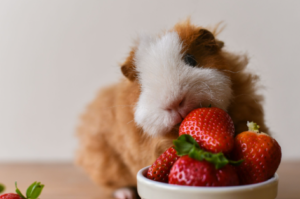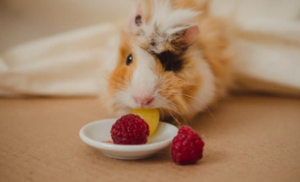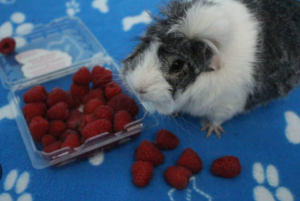Guinea pigs, with their playful nature and sensitive digestive systems, require a well-balanced diet to stay healthy. As a pet owner, you might wonder if certain fruits, like raspberries, are safe for your furry friend. In this detailed guide, we’ll explore whether guinea pigs can eat raspberries, the benefits and risks of this treat, and how to serve it safely.
Can Guinea Pigs Eat Raspberries?

Yes, guinea pigs can eat raspberries in moderation. These sweet and tangy fruits are packed with nutrients that can benefit your pet. However, due to their sugar content, raspberries should only be given as an occasional treat rather than a staple in their diet.
Nutritional Value of Raspberries
Raspberries are not only delicious but also rich in essential nutrients. Here’s a breakdown of their nutritional content per 100 grams:
- Vitamin C: 26.2 mg
- Fiber: 6.5 g
- Carbohydrates: 11.9 g (with 4.4 g of sugar)
- Calories: 52
- Antioxidants: High levels of flavonoids and ellagic acid
These nutrients can offer several benefits to guinea pigs, but moderation is key to avoiding potential health issues.
You may love this one: Can Rabbits Eat Parsley?
Benefits of Feeding Raspberries to Guinea Pigs

Rich in Vitamin C:
Guinea pigs cannot produce their own vitamin C, making it a crucial part of their diet. Raspberries can help prevent scurvy, a common deficiency in guinea pigs, which can lead to lethargy, weight loss, and joint problems.
High in Fiber:
The fiber in raspberries aids in digestion, promoting a healthy gut and preventing gastrointestinal issues.
Antioxidants for Immune Support:
The antioxidants in raspberries help combat free radicals, boosting your guinea pig’s immune system and reducing the risk of illnesses.
Low in Calories:
Raspberries are a low-calorie treat, making them a guilt-free snack option for your pet.
Risks of Feeding Raspberries to Guinea Pigs
While raspberries offer several benefits, overfeeding can lead to health issues. Here are some risks to consider:
High Sugar Content:
Guinea pigs are prone to obesity and diabetes, and the sugar in raspberries can contribute to these conditions if given in large quantities.
Digestive Upset:
Too much fruit can disrupt a guinea pig’s delicate digestive system, causing diarrhea or bloating.
Allergic Reactions:
While rare, some guinea pigs may be allergic to raspberries. Always monitor your pet for signs of discomfort after introducing new foods.
Pesticide Residue:
Non-organic raspberries may contain pesticides harmful to guinea pigs. Washing the fruit thoroughly or opting for organic produce is essential.
How to Safely Feed Raspberries to Your Guinea Pig
To ensure your guinea pig enjoys raspberries safely, follow these steps:
Wash Thoroughly:
Always wash raspberries under running water to remove dirt, pesticides, and bacteria.
Portion Size:
Limit raspberries to 1-2 small pieces, no more than twice a week. This helps prevent overconsumption of sugar.
Serve Fresh:
Only serve fresh, ripe raspberries. Avoid canned or frozen varieties, which may contain added sugars or preservatives.
Introduce Gradually:
When introducing raspberries for the first time, give your guinea pig a tiny piece and observe for 24 hours. Look for signs of digestive upset or allergic reactions.
Pair with a Balanced Diet:
Raspberries should complement a diet rich in hay, fresh vegetables, and guinea pig pellets. They are not a substitute for these staples.
Other Fruits Safe for Guinea Pigs
If your guinea pig enjoys raspberries, you might want to try other safe fruits in moderation:
- Strawberries
- Blueberries
- Apples (seedless)
- Pears
- Watermelon
Remember, fruits should only make up about 10% of your guinea pig’s diet.
Signs That Your Guinea Pig May Be Eating Too Much Fruit

Overfeeding raspberries or any other fruit can lead to noticeable health issues. Watch out for these signs:
- Loose stools or diarrhea
- Sudden weight gain
- Lethargy or reduced activity
- Excessive thirst (a sign of potential diabetes)
If you notice any of these symptoms, cut back on fruit intake and consult a veterinarian.
Why Moderation is Key
Guinea pigs have small bodies and sensitive systems. Even healthy treats like raspberries can be harmful in excess. By following portion guidelines and balancing their diet, you can ensure your guinea pig enjoys the occasional raspberry without negative effects.
Conclusion
Raspberries can be a delightful and nutritious treat for your guinea pig when fed in moderation. They offer essential nutrients like vitamin C and antioxidants while adding variety to your pet’s diet. However, it’s crucial to balance this treat with their regular hay, vegetables, and pellets to maintain overall health.
By understanding the benefits and risks, you can confidently include raspberries as a part of your guinea pig’s diet, ensuring a happy and healthy furry friend. Always remember: when in doubt, consult with a veterinarian to make the best dietary choices for your beloved pet.
